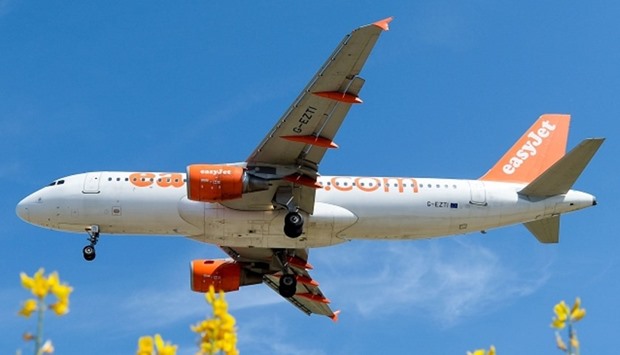* Shares drop 6 percent, top FTSE 100 faller
* Weak pound and late Easter hit budget airline's results
* Keeps outlook as competition eases, costs under control
* Will take 30 Airbus A321neo planes instead of A320
British budget airline easyJet stepped up its efforts to lower operating costs by ordering bigger planes after it posted a wider first-half loss on Tuesday which sent shares down 6 percent following recent strong gains.
EasyJet, Europe's second largest low cost carrier after Ryanair, said the weak pound and the late timing of Easter this year had hit its results for the six months to the end of March.
The company said it was seeing signs that revenue pressure was easing with rivals holding back on growth in some of its big markets. It also announced plans to convert part of an Airbus order to larger planes to help drive down costs.
But that came too late to help the first half when the headline loss before tax rose to 212 million pounds ($2732 million) compared to a loss of 21 million a year ago.
The average analyst estimate was for pretax loss of 195.75 million pounds, according to Thomson Reuters estimates.
The company said strict cost control and easing price pressures meant it still expected to meet its full-year targets.
‘Looking ahead, we are seeing an improving revenue per seat trend as well as the continued reduction of competitor capacity growth’ Chief Executive Carolyn McCall said. ‘Cost performance for the full year will continue to be strong.
SHARES SLIDE
The first half figures included an estimated 45 million pound hit from Easter falling into the second-half, and a negative net currency impact of 82 million pounds.
EasyJet shares, which have risen around 40 percent in the three months ahead of the update, were on track for their worst day in two and a half months on Tuesday.
‘The recent share price rally needed an upgrade, in our view, with too much hope that better long-haul trading seen at flag carriers would come to pass in short-haul too,’ said analysts at Panmure Gordon.
‘Our Sell rating reflects the stuttering growth profile’
The airline said it will take 30 A321neo planes with 235 seats from next summer, instead of 30 smaller A320neo planes. The larger planes will enable it to reduce costs by about 8-9 percent compared with the 186-seater A320neo.
Chief Financial Officer Andrew Findlay said easyJet had exercised some deferral rights on Airbus planes as part of the switch to the larger planes in order to keep a lid on spending. Together with plans to exit some operating leases, that means easyJet now expects to have 343 planes in its fleet in 2021, versus a previous plan for 357. Its capital expenditure plans will come down by 250 million pounds over the next three years.
EasyJet is seeking a new operating licence in another EU member state to ensure it can continue flying within and between EU member states following Brexit, which it said it would secure before the summer.

